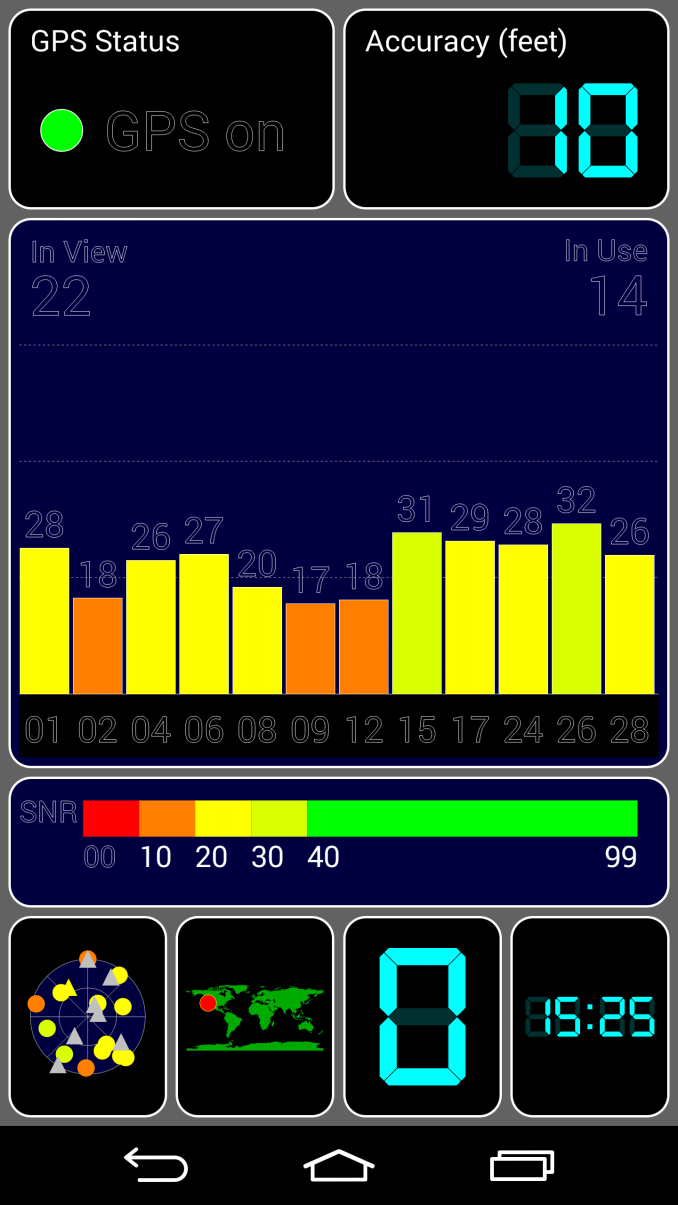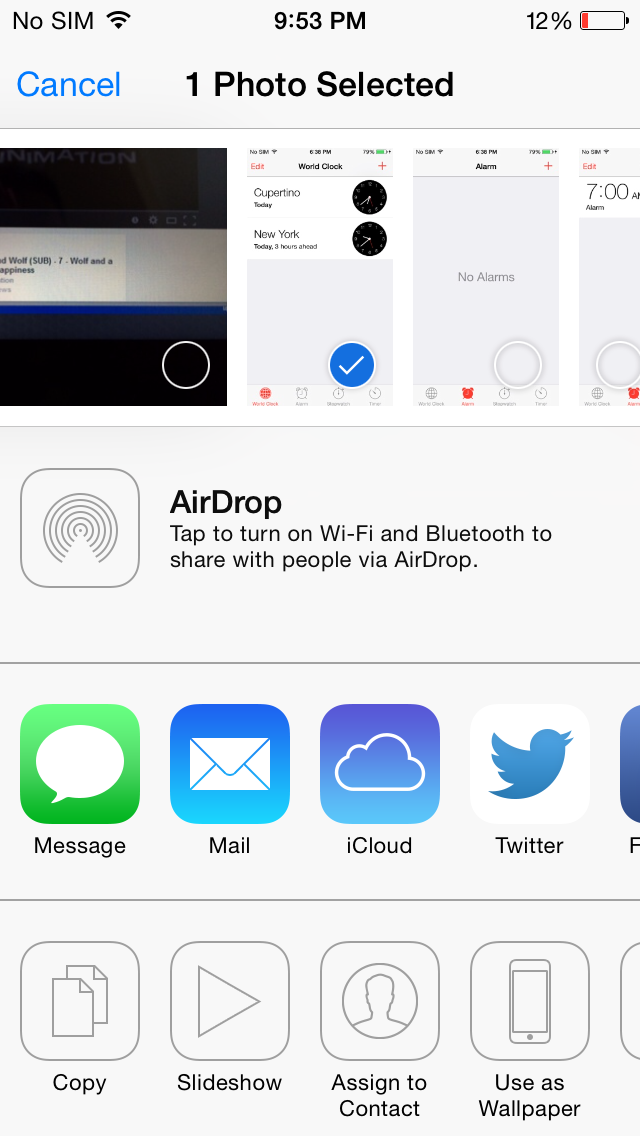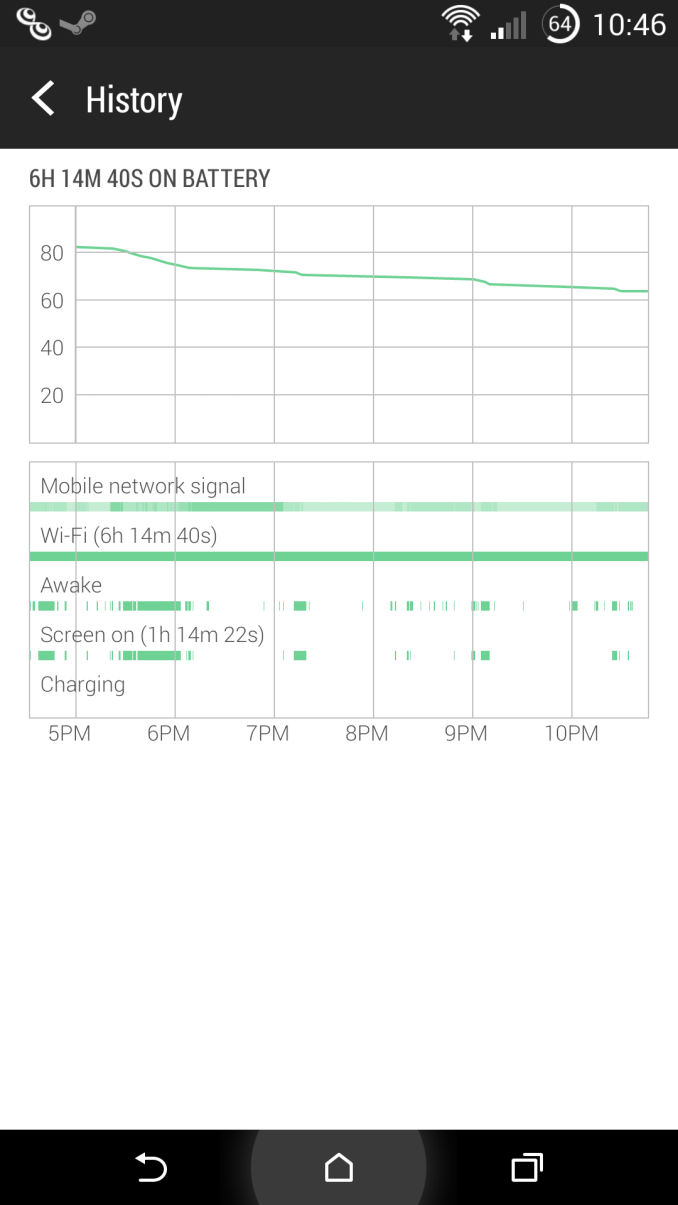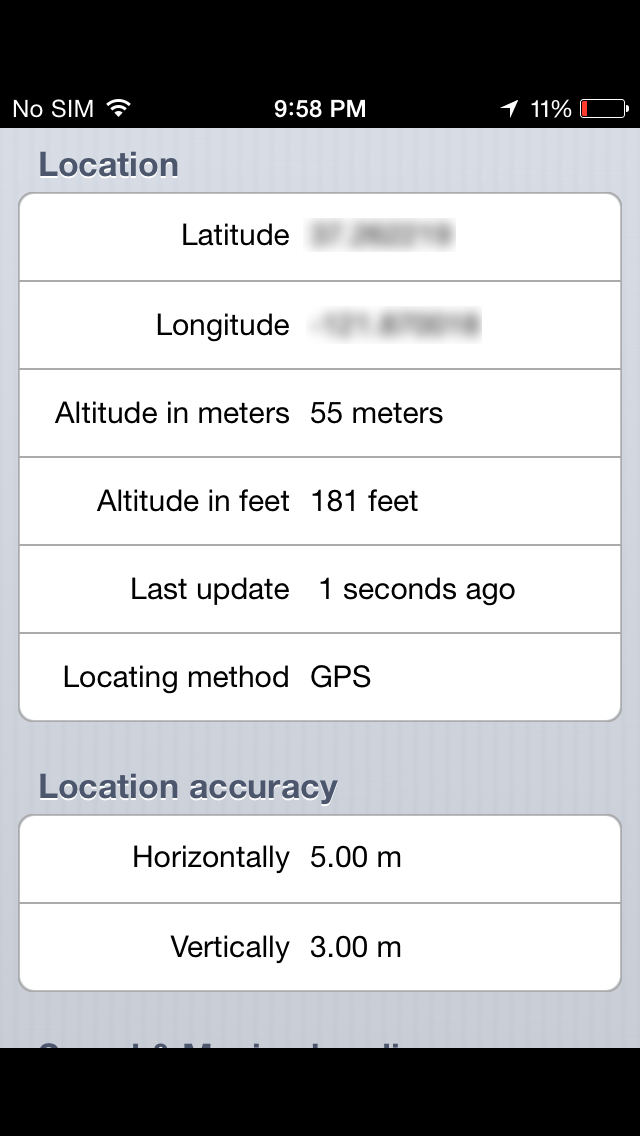A Month with the iPhone 5s: Impressions from an Android User
by Joshua Ho on August 24, 2014 7:00 AM ESTSoftware
From a purely functional perspective, there are some pain points involved in moving from Android 4.4 to iOS 7. While it’s been talked to death now, the lack of a system similar to intents on Android and the lack of customizable keyboards are definitely a bit on the frustrating side. For example, while on Android manually uploading screenshots, photos, and video to Dropbox is a relatively painless process, doing the same on iOS isn’t possible. While one of the first things I do on any Android smartphone is install SwiftKey, it’s not possible to do the same on iOS. This immediately causes my typing speed to drop, although in the case of iOS’ keyboard this is mostly due to the lack of punctuation in the letter page. However, these two immediate issues are about to be irrelevant with the release of iOS 8, so this is more of a temporary issue than a permanent one.
Although also temporary, for those that have become accustomed to the significant amount of custom control provided by camera apps from HTC and Samsung, the iOS camera application is comparatively barren. There's the ability to toggle HDR, flash, tap to focus/expose and lock focus/exposure. In effect, there's no real way to set manual controls. While the auto mode is pretty much as good as it gets, I find myself missing manual controls when it comes to taking macro photos and in other similarly extreme conditions.
There are a few other issues though. To someone that has almost solely used Android smartphones, the notification drawer has some odd behavior. It’s never really made sense to me why notifications can only be cleared by application. I definitely think a clear all notifications button would be a good addition for the future, but this is only a significant problem if a large number of notifications build up without getting cleared away. I'm also not sure what the value is to segregating "all" and "missed" notifications. Android definitely handles this better, although it probably makes more sense to those that have used iOS' notification system from the start.
Outside of these issues, there’s quite a lot to like. The vast majority of applications that I used had a consistent style that fit with iOS 7, with no strange scaling issues or unexpected behavior. This still tends to be a problem in Android, so it’s refreshing to have an app ecosystem that tends to keep up with the design guidelines set with each new iOS release. There’s also just about no stuttering or pausing in the experience. While Android L and ART should bring much better performance to Android smartphones, in iOS it seems that such performance issues haven’t really existed in the first place.
iOS and Android/Sense 6 battery stats
Of course, while there are some issues that could be fixed, there are others that are much more fundamental. One of these is direct access to the file system. While it’s quite convenient in Android to trawl through system files to learn about the underlying hardware and move around data using a file explorer, it makes sense to completely sandbox applications from each other to improve security. Another advantage of sandboxing applications is that orphan files are nonexistent, which is an issue on Android devices.
In addition to file system differences, it’s a bit frustrating to not have detailed battery life statistics when it comes to how much CPU time each application consumes, how long application wakes up the system while the screen is off, and similar details. However, it once again makes sense for Apple to do this. After all, iOS battery management is already quite stringent. In general, applications are strictly regulated and most cannot run in the background for any significant amount of time. On Android, it's possible for a single rogue application to ruin battery life, but this same system means that multitasking tends to be much faster and smoother.
If anything, this may be the real difference that matters when comparing iOS and Android. While Android and iOS are largely similar in features, there is a fundamental divide in the way the two OSes are designed. At its core, iOS is designed with average users in mind. As a result, there’s a strong emphasis on making things “just work” and hiding information that would simply confuse and frustrate people that don’t care about the underlying hardware and software. Android at its core is targeted at those that want to have the full PC experience on their phone, and as a result there’s much more information and low level functionality for those that want it. However, this can easily be frustrating and confusing for the end user. Of course, it’s fully possible for iOS to adopt features that would be targeted at advanced users, and Android can be changed to be more user friendly. If anything, this hypothetical has been the case for the past few years. Over time, Android has become a more friendly OS with the removal of the search and menu keys, going from the dark themes of 2.3 and 3.0 to the brighter, cleaner designs of today. Things like Google Maps have become considerably more simplistic, and even microSD slots had significant restrictions added to them in an attempt to simplify the user experience. Similarly, the fact that manual camera controls are even possible speaks to how Apple is adding more niche features.

GPS Info! on iOS and GPS Test on Android
However, the differences remain, and understanding this is as simple as looking at how equivalent features are implemented. For example, location services in iOS are binary in nature, and can only be turned on and off globally or for each application. In Android there’s noticeably more nuance. Location can be done only by on-device GPS, or by using WiFi/cell tower location, or by using both. In addition, it’s possible to view GPS data such as per-satellite SNR and number of satellites used and in view.
Final Words
At the end of the day, the iPhone 5s has aged quite well. While the hardware quality is a cut above, it’s more than just a matter of pure hardware. It’s clear to me that the user experience wouldn’t be nearly as good without Apple’s strong control over software. TouchID is quite possibly the best example of this, as there’s no need to wait for an official API to support fingerprint authentication for App Store purchases or other similar situations. While I felt a bit constrained by the limits in the operating system, the integration and overall quality of the experience outweighed these disadvantages. I’m not quite sure if either is better at this point, as while I definitely enjoy the amount of low-level information and customization available on Android, iOS has a much more polished and highly integrated experience.
However, in the long run it seems likely that they will converge towards largely similar feature sets. This doesn't mean that they'll be identical, as there's a distinct parallel in the Mac vs Windows debate. In Windows, adoption of new hardware features into the OS tended to be slower and not as well integrated as the OS vendor and multiple OEMs had to try and coordinate such a task. However, a major advantage of such a system was that backwards compatibity and flexibility was greater, even if it was more complicated for the end user. Similarly, Mac has tended to have new features at a faster pace and with better integration, such as high DPI displays. However, the result tends towards less control over low-level settings and less visibility into low-level information. The tight integration between hardware and software also means that it's harder to provide extensive backwards compatibility.
Of course, these are mostly broad strokes. It's not really possible to predict what the future holds, but even now we can see major differences. Google has allowed for custom OEM UIs on top of Android, and doesn't profit directly from the sale of Android OS. Similarly, the nature of smartphones dictates tight integration, so it's not really possible to upgrade the OS without a new BSP and major work on the part of the OEM to push an OTA. Apple has also managed to ensure that the app ecosystem of iOS is equal to or greater than any other mobile OS, something that was a major stumbling block with Mac OS in the early days of personal computing. While a great deal of maturation has occured in the smartphone market, there is still a long road ahead before the story can end.



_575px.PNG)
_575px.PNG)
_575px.PNG)










197 Comments
View All Comments
Ofaring - Tuesday, September 16, 2014 - link
I've gotta strongly disagree with the writer's software conclusions and agree with what others have said here. But before I continue, two points: 1. I used to solely love Android from the Froyo days on and mock the iPhone. 2. I still use all the OSes because I work with them in my job. That said...the writer spoke about a true PC experience. If he was referring to hacking your computer and puttering around with files and settings to see what you can do, then yes, that's a computer experience. (And I do it on Android.) If, however, he wanted to accomplish actual work other than fiddling, Google apps, and social media, good luck! I use smartphones to accomplish more work on the go than anyone else I know, and the reason I stopped mocking iPhone is because they offer the only real computer experience on the market today. I've even produced gorgeous documents and spreadsheets with Numbers and Pages, software which doesn't have a rival on the Play Store. (And I use Dropbox all the time.) Never mind the host of quality, beautiful, well-made apps available over the clunky, occasionally-useful apps which tend to plague the Play Store.As for GPS controls, it's as simple as turning wifi on/off to "fine tune" it, and there are apps available to show satellites, but that's minor. Real fine tuning is being able to tell a specific app, "No, you may NOT use my location." To get that kind of fine tuning on Android you have to install a custom ROM – and there you will find countless hours of fiddling, er, using a PC. (According to the writer.) That's speaking from personal experience.
It's all perspective, right?
invinciblegod - Sunday, August 24, 2014 - link
I don't understand how you got that impression. He praised touchid and the other differences are quite minor besides from the app sharing. He mentioned many downsides of the android method in addition to the downsides of the ios version. And I question your need to see other people "condemn" the os.Mugur - Monday, August 25, 2014 - link
I have a friend which is essentially a power user but with a 100% non-technical background. I have always helped him with his various PCs, tablets, phones technical issues. Last autumn his HTC One M7 was stolen and he received an iPhone 5s from work. Although he now appreciates the ease of use and the polish (hardware and software) of it, some frustration still remains. Exasperation was his exact word for the first 3 months... :-)He seems overall happy now with the iPhone, but I have asked him and he still says that if given the opportunity (i.e. for free) he would exchange it for an M8 One any time.
CaptSkunk - Monday, August 25, 2014 - link
He doesn't need to condemn the iPhone. The 5S is a very good phone. I have had it since the end of May and have very little, if anything to complain about. Before that, I had the 4S and it too, was a great phone, just not as good as the 5S.I find iOS cleaner than Android. True, my last venture was on Gingerbread, with a phone that never received an update to Android. I found Android stable but just too much in the long run. Why do I need file system access on a phone? Do I really need to type word documents and excel spreadsheets on my phone? I have my computers for that.
Android is confusing for most people, until you really dive in and learn every nook and cranny. This is coming from someone who very much so, knows their way around a computer, knows how to use bash and can build computers and the like.
People that bash iPhones are mostly just fanboys or want way too much from a phone. When you want too much, you get what that GPS picture shows. That looks horrendous on Android.
Samus - Monday, August 25, 2014 - link
I replaced my Galaxy S III with a 4S after about a year with the Galsxy (my third Android phone since 2009) and I just got tired of Android's quirks. The simplicity of IOS and the fact it just works as a phone is what makes it great, even for tech-oriented people.My favorite phone of all time is the Palm\HP Veer, though.
milesmutt - Thursday, September 18, 2014 - link
Are you kidding me? You've either never used the iPhone for a discernible amount of time, or you're just talking out of your ass. User-friendliness is the hallmark of iOS, and suits the vast majoritiy of smartphone users out there. Sure, there are numerous customizations available for Android, but who really needs all that shit? On a smartphone? If I want to tinker, I'll tweak my custom-built Windows gaming PC (don't use Macs and never will). I just want my smartphone to be quick and easy to use, whether it be for email, texting, watching ripped movies, listening to music, or even (gasp) making phone calls!The Samsung S4 that I owned for a few months (yes, I actually did try out Android for a while) was absolutely horrid for movie playback because of stutter, and not quite as easy to use for playing music. Also, games were not as fluid on the S4 as they were on even the older iPhone 4S! Okay, there are a lot more pixels to push on the S4, but the experience suffered greatly because of this. Perhaps these issues disappeared with the S5 and Note 3 because horsepower was bumped up, but I will never know.
Bottom line is that iOS is and probably always will be, the gold standard when it comes to multimedia in a smartphone.
jonodw - Sunday, August 24, 2014 - link
I would be interested to see you do this one month test with a Lumia 930.MonkeyPaw - Sunday, August 24, 2014 - link
I'm still at a loss for why they never fully reviewed the 1020. I guess a 41MP sensor in a phone wasn't noteworthy enough.I have an iPhone for work. What amazes me most is just how poor the battery life is, and I only use it for calls and texts. Apple tunes their signal bars to make you think you have better signal than you really do (less than 4 bars = no data). The screen is tiny, but the camera is pretty good. I would never own an iPhone by choice. I thought it was cool at first launch, but it has since been eclipsed by many other devices.
chizow - Sunday, August 24, 2014 - link
Haha wow I was just about to post the complete opposite! What model iPhone do you have? I have a 5S for work and the one remarkable thing I've found about it is the amazing battery life for light usage scenarios. Checking texts and emails, snapping pictures, 2-3 calls a day. I even run Pandora on my iPhone over my GS4 because it handles battery life while running apps when the screen is off better. I can often go 2-3 days before I have to charge my iPhone 5S....my GS4 needs to be charged daily without fail, and on heavy usage days, I need to whip out the microUSB adapter and pull some juice from my laptop.MonkeyPaw - Sunday, August 24, 2014 - link
4S. Even just idling this weekend with no email accounts to sync, it's almost dead. Granted, my cheap employer probably bought a refurbished model.